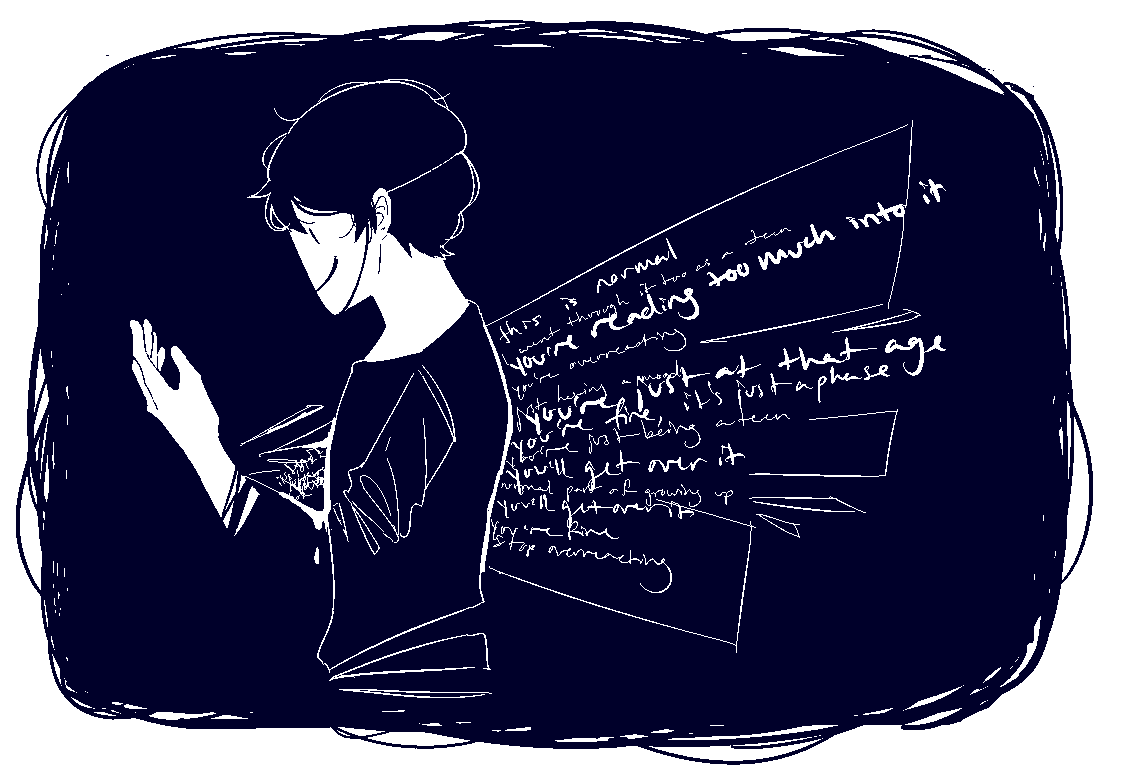Words are harmful–especially if they’re what’s standing in the way of getting help. Being told that “It’s just a phase,” or “this is a normal part of being a teen,” can be extremely damaging to teenagers who are actually mentally ill. Cartoon by Ashley Lawrence.
By ASHLEY LAWRENCE – Staff Writer
It is not uncommon for teenagers to be easily agitated and desire more independence. However, it becomes problematic when this behavior is used to dismiss actual mental illnesses.
According to the Standard-Examiner website, teen angst is “the feeling of ‘ugh-I’m-so-misunderstood-what-is-life?” part of adolescence.” It is often accompanied by states of depression that is the product of the conglomeration of hormones and school stress. Teen angst is the name that encompasses the phrases frequently used to rebuff confession of detrimental feelings, such as “It’s just a phase” or “That’s just how teenagers are.”
But where is the line between teen angst and actual mental illness?
Though 20% of teenagers have a diagnosable mental health disorder, only 1 in 5 teenagers get the help they need. This is because the concept of teen angst causes teens to invalidate their own feelings or because they are told by adults that their feelings are just a normal part of growing up.
The problem this creates is that unchecked mental illness often results in it becoming progressively worse or a recurring problem. Therefore, writing off every negative mood as teen angst can be very harmful for teenagers, especially given that 90 percent of people who commit suicide had an underlying mental illness, and suicide is the third leading cause of death for adolescents.
Though it may be rebuffed as overreacting, feeling swarmed with negative emotions is enough of a reason to seek help. Teenagers should not have to feel like they have to prove that they have an illness; they should be listened to from the beginning. Discrediting these feelings may make the teen blame themselves for being unable to “get over it,” or make a mental illness go unnoticed until adulthood when negative behavior isn’t so “normal” anymore.
Depression in adolescents is no different than that in adults. Due to the differences between teen and adult brains, however, it is possible that teenagers will respond differently to depression than adults will. For example, teenagers are more likely to become dependent on illicit drugs to cope with depression than adults are.
It is important to be able to tell the difference between teen angst and mental illness in order to prevent it from going unnoticed. One distinct characteristic of mental illness is the severity and length of someone’s attitude. If deterioration in behavior or mood lasts for two weeks or longer without pause, they may be suffering from major depression.
Ultimately, not all teenagers are over-dramatic and contentious, and the mentality that they are is overlooking a much larger problem. Mental illnesses must be acknowledged and treated from the start. The concept of teen angst prevents mentally ill teenagers from getting the help that they need and needs to stop.
